|
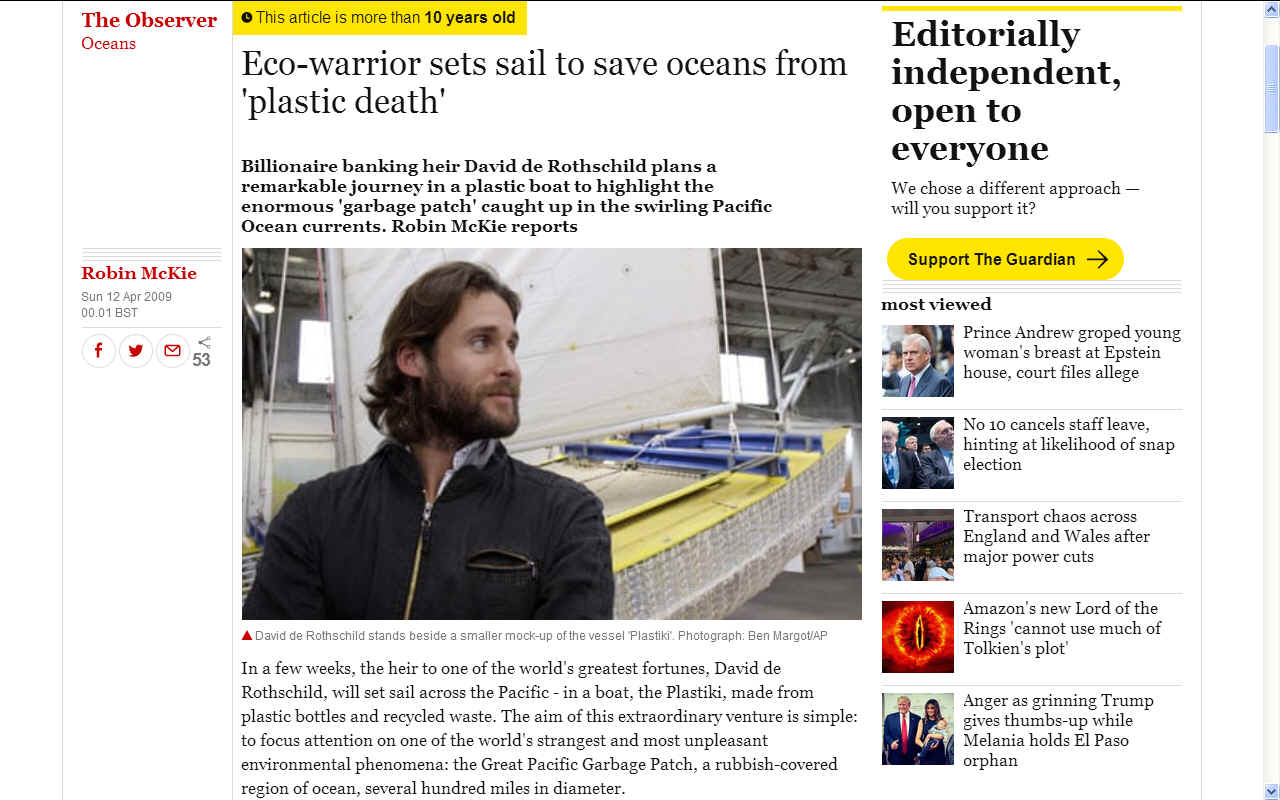
ECO
WARRIOR - Born into one of the world’s richest and most powerful dynasties, banking heir and eco-warrior, David de Rothschild has serious clout to wield and he is channelling much of it into raising public awareness. In his sights are the hundreds of kilometres of plastic debris that is threatening to strangle the North
Pacific
Ocean.
A committed environmentalist and adventurer, de Rothschild and his handpicked team have built a 60-foot catamaran, the Plastiki, made entirely from recycled material, essentially srPET (self-reinforced polyethylene terephthalate) a new plastic product developed in Europe similar in strength to
fiberglass but made from 100% recycled plastic. Its twin hulls are moulded from 12,000 recycled two litre plastic bottles. The name Plastiki is a salute to the Kon-Tiki, a raft made from balsa wood which, in 1947, sailed 7000 kilometres across the Pacific. In July 2012 de Rothschild completed an epic three-and-a-half month journey crossing the Pacific from San Francisco to Sydney. His focus as the Great Pacific Garbage Patch, but the Plastiki will also drew attention to the sinking islands of Tuvalu and the effects of mass pollution, sub-water testing of nuclear armament and coral bleaching.
The over-riding message of the Plastiki project is ‘plastic is not the enemy’. ‘It’s not the plastic that’s to blame, but the inability to understand how to use and reuse it properly,’ he says. His hope is that the legacy of the Plastiki will be a clear demonstration that solving waste issues is going to require a major re-think of how we currently use, reuse and ultimately dispose of plastics. ‘It’s a big step from problem to solution because we haven’t created the playing field to engage and encourage solutions,’ he says. ‘This issue is solvable but it’s going to require all three sectors working together.’
THE
GUARDIAN - APRIL 12 2009 - Eco-warrior sets sail to save oceans from 'plastic death'
Billionaire banking heir David de Rothschild plans a remarkable journey in a plastic boat to highlight the enormous 'garbage patch' caught up in the swirling Pacific Ocean currents. Robin McKie reports
In a few weeks, the heir to one of the world's greatest fortunes, David de Rothschild, will set sail across the Pacific - in a boat, the Plastiki, made from plastic bottles and recycled waste. The aim of this extraordinary venture is simple: to focus attention on one of the world's strangest and most unpleasant environmental phenomena: the Great Pacific Garbage Patch, a rubbish-covered region of ocean, several hundred miles in diameter.
The patch, north-west of Hawaii, was discovered in 1999 by researchers who found that its waters contained tens of thousands of pieces of plastic per square mile, the remains of rubbish caught in the region's circulating ocean currents. This pollution is now devastating populations of seabirds and fish that live in the region.
During his trip, which is being sponsored by the International Watch Company and Hewlett-Packard, de Rothschild will collect water samples and post blogs, photographs and video clips of the area, in an attempt to publicise the perils posed by plastic pollution.
To further highlight the oceans' plastic pollution problems, the 30-year-old environment crusader has designed a special catamaran with a hull made of frames filled with 12,000 plastic bottles. The cabin and bulkheads of Plastiki have also been constructed out of a special recycled material called srPET, made of webs of plastic.
"The plastic water bottle epitomises everything about this throwaway, disposable society," said de Rothschild, who trained to be a showjumper in England and who has trekked to both the north and south poles. However, he added that he was not aiming to demonise plastic, but was trying to highlight its alternative uses, as well as focusing global attention on the dangers posed to the ecology in regions such as the Great Pacific Garbage Patch.
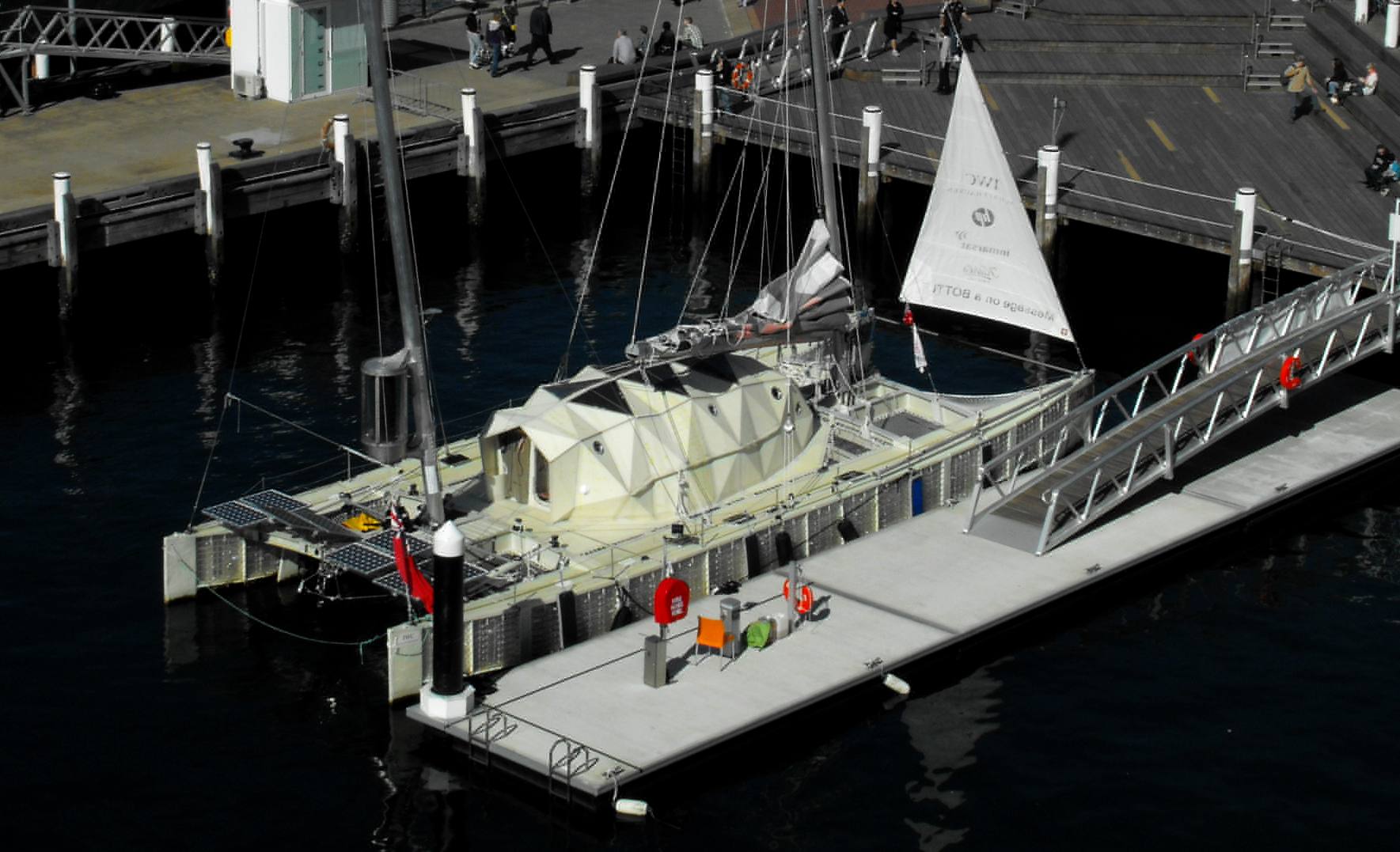
PLASTIC
CATAMARAN - It looks like a lot of fun
was had making this sailing boat from plastic bottles and other recycled
polymers.
Plastiki‘ sailed its way into sydney’s darling harbour today after traveling 130 days and 8000 nautical miles from san francisco.
The catamaran is made from 12, 500 recycled plastic PET bottles was the brainchild of british adventuer david de rothschild – founder of adventure ecology. ‘Plastiki’ began her adventure nearly four years ago after taking inspiration from a report issued by UNEP (united nations environment programme) called ‘ecosystems and biodiversity in deep waters and high seas’ and thor heyerdahl’s epic 1947 expedition, the kon-tiki. David de Rothschild and his five member crew sailed from sydney to san francisco hoping to raise awareness about the amount of plastic floating in the world’s oceans.
The Plastiki - its name inspired by the balsa raft Kon-Tiki that was built and sailed across the Pacific in 1947 by the Norwegian explorer Thor Heyerdahl - is now undergoing trials in San Francisco harbour. "The project has gone through several materials, exploring everything from bamboo to plywood, even playing around with the idea of sewing all the bottles together in one giant sock," said de Rothschild.
As a result, the 20-metre
catamaran has cost several million dollars to construct and has taken three years to reach its current design. When it is ready, in a few weeks, it will carry de Rothschild and a crew of six on a 10,500-mile journey from San Francisco to Hawaii, Midway Island, Bikini Atoll, Vanuatu and, finally, Sydney. There will be no accompanying craft, but the Plastiki will be met by a support team at each landfall.
The destinations for the craft's great voyage have been selected to highlight a variety of environmental threats, including
overfishing and
climate
change. However, the most important part of Plastiki's route will be its voyage round the
Great Pacific Garbage Patch in the Pacific, where it will focus global awareness on the issue of marine debris and pollution.
The patch was discovered 10 years ago by the oceanographer Charles Moore when he was sailing off Hawaii. "I was confronted, as far as the eye could see, with the sight of plastic," Moore later recalled. Among the items he spotted were plastic coat hangers, an inflated volleyball, a truck tyre and dozens of plastic fishing floats.
"In the week it took to cross, no matter what time of day I looked, plastic debris was floating everywhere: bottles, bottle caps, wrappers, fragments." Indeed, the term "patch" does not begin to convey the nature of the phenomenon, Moore added. A "plastic soup" has been created, he said, one that has spread over an area that is now bigger than state of Texas.
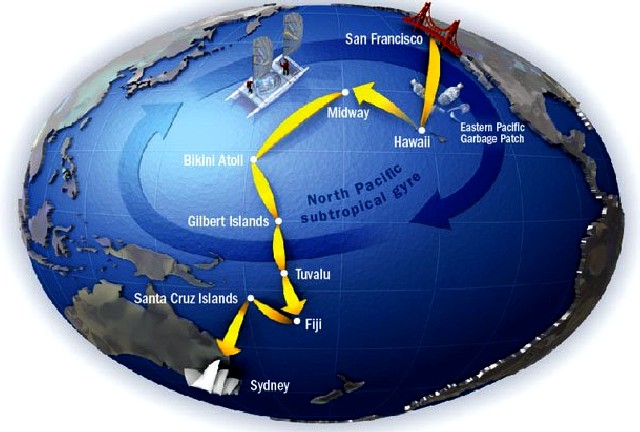
The plastic - most of it swept from coastal cities in Asia and California - is trapped indefinitely in the region by the
North Pacific
Gyre, a vortex of currents that circulate clockwise around the ocean. Scientists estimate that there is six times more plastic than plankton by weight in the patch and that this is having disastrous ecological consequences. Fish and seabirds mistake plastic for food and choke to death. At the same time, plastics absorb pollutants including PCBs (polychlorinated biphenyls) and pesticides, bringing poisons into the food chain.
In one study of plastic pollution in the Pacific, scientists found that populations of albatrosses in the north-west Hawaiian islands, a national marine sanctuary, have been devastated by plastic from the garbage patch. "Their body cavities are full of huge chunks of many types of plastics, from toothbrushes to bottle caps to needles and syringes," said Myra Finkelstein, an environmental toxicologist based at University of California, Santa Cruz. "They can't get them up. They can't get them out. It's heartbreaking."
This point is backed by Moore. "The plastic gadgets one typically finds in the stomach of one of these birds could stock the checkout counter at a convenience story," he said.
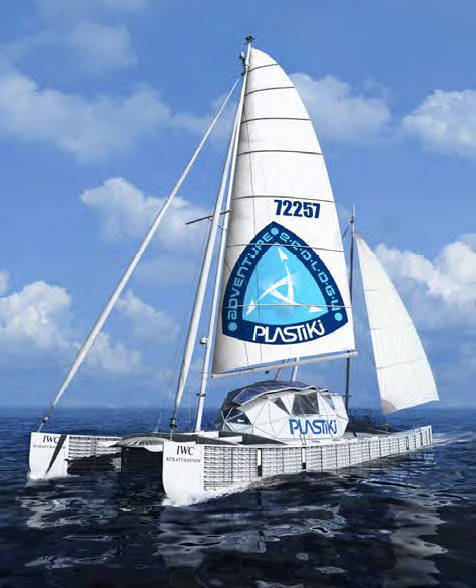
Last year, a raft built of waste and debris, known as the Junk
Raft, was built by the Algalita Marine Research Foundation, which had been set up by Charles Moore after discovering the Great Pacific Garbage Patch. This simply constructed craft floated on a mass of 15,000 plastic bottles and was sailed through the patch by oceanographers Marcus Eriksen and Joel Paschal. They too were aiming to highlight the global issue of plastic pollution in the oceans.
However, de Rothschild insists his project has a grander vision. He is seeking not just to show up the planet's ecological woes but, through the design and construction of Plastiki, he will also be highlighting how disposable plastics can be used in a constructive way.
"I want the Plastiki to make a statement that it's our lack of reuse, uses and disposal that it is at fault, not the material itself," he said.
The eco-warrior has also designed his mission so that it copies key features of the voyage of the Kon-Tiki in which Thor Heyerdahl - a hero of de Rothschild - sailed across the Pacific to show how ancient South American Indians could have colonised Polynesia. As a result, de Rothschild originally set his launch date for 28 April - exactly 62 years to the day when Heyerdahl set out on his epic journey across the Pacific. However, teething problems with Plastiki recently forced him to postpone departure until later this summer.
Nevertheless, de Rothschild insists his craft will sail in the next few weeks and could one day revolutionise the use of recycled plastics in general and the design of boats in particular. Much will depend on how his craft behaves once the Plastiki expedition is under way, he admitted to the New Yorker recently. His craft should perform well, but could break up, he said.
"These are just unknowns," he added. "That's an adventure! If it was planned and everyone knew, no one would be interested."
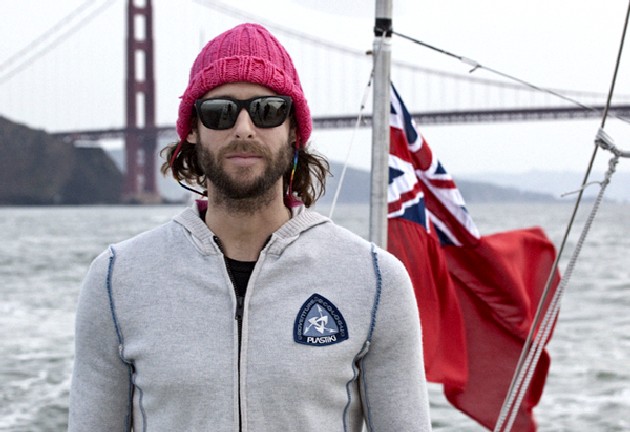
Life of an eco-toff
David de Rothschild regularly appears in Tatler's list of Britain's most eligible bachelors. He is the third child of Victoria Schott, a former fundraiser for the
Conservative
party, and Sir Evelyn de Rothschild, head of the British branch of the family banking empire.
He was a member of Britain's junior eventing team, and has taken part in trekking expeditions across the Antarctic and Arctic icecaps, making him the youngest Briton to reach both poles. He owns an organic farm in New Zealand, and later founded Adventure Ecology which aims to use his travels as a way to engage children in green issues.
He is also author of the Live Earth Global Warming Survival Handbook. In 2007, these feats earned him inclusion in the
National
Geographic's class of Emerging Explorers. He is also known as one of the country's leading "eco-toffs", those young men and women who use their inherited wealth to promote environmental causes.
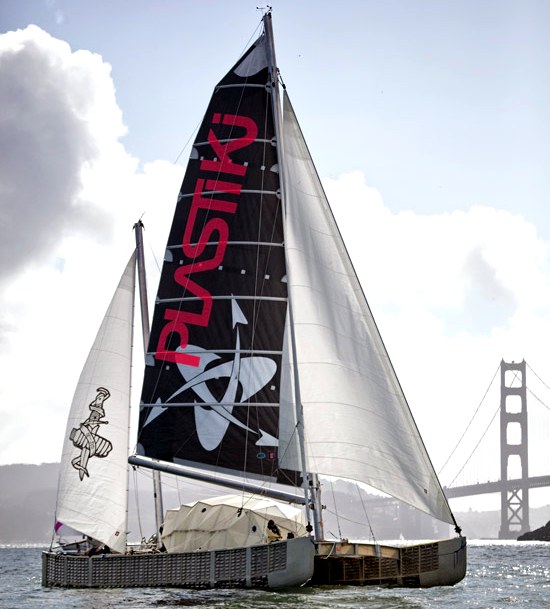
SOLAR
POWERED - Like many boats these days Plastiki is ‘off-the-grid’ relying on renewable energy systems to function including: solar panels, wind turbines, trailing sea turbines, bicycle generators, a vacuum water evaporator for desalination, a urine-to-water recovery system and rain water catchment, a separating toilet and waste storage with evaporative technology for weight reduction, hydroponic vertical garden and an electrical system based around a bank of six 12 volt batteries.
The boat’s overall design and sail plan only permits it to sail with the wind just forward of her beam – she is a down-wind vessel. in keeping with the design ethos there are no
centre-boards so the boat sometimes goes sideways, as well as forward.
MORE
ADVENTURES
David
de Rothschild is a member of the Rothschild family, the youngest of three children of Victoria Lou Schott (born 1949) and Sir Evelyn de Rothschild (b. 1931) of the Rothschild banking family of England. His middle name "Mayer" is taken from the name of the founder of the Rothschild family banking empire, Mayer Amschel Rothschild.
The youngest heir to his family's banking fortune, de Rothschild was born in 1978 in London, England. His mother is American, the daughter of Marcia Lou (née Whitney) and real estate developer Lewis M. Schott. He is the younger brother of Anthony de Rothschild and Jessica de Rothschild.
As a teenager, de Rothschild was a top-ranked horse jumper on Britain's junior event team. He later gave up the sport to pursue his education, stating in an interview with The New Yorker "I realized there was more to life than spending hours and hours and hours on a horse."
After leaving Harrow School in 1996 he attended Oxford Brookes receiving a 2:1 B.Sc (Hons) in Political Science and Information Systems. In 2002, de Rothschild studied at the College of Naturopathic Medicine, London where he received an advanced Diploma in Natural Medicine, ND. By age 20, de Rothschild had started his own music merchandising business and sold it. In 2001 he bought a 1,100 acre organic farm in New Zealand, and was invited to take part in a Polar expedition. This experience turned de Rothschild into an enterprising eco-adventurer.
In 2006, de Rothschild spent over 100 days crossing the Arctic from Russia to Canada, which saw him become one of only 42 people, and the youngest British person, to ever reach both geographical poles. He had already become one of only 14 people ever to traverse the continent of Antarctica, and was part of a team that broke the world record for the fastest ever crossing of the Greenland ice cap. In 2006 he launched the website "Mission Control" in order to present his expeditions and environmental efforts to children and the youth. The trek across the Arctic was the first "mission" to be highlighted on the website, and the second was planned to either be a trek through the Amazon or a trek from Lake Baikal to the Gobi Desert.
His expeditions also led to his founding of the Adventure Ecology organization, in order to use adventure to help inspire people to live more sustainably. Adventure Ecology is driven towards the youth demographic but is accessible to others as well. It serves as a community and network for the discussion of climate change and associated problems.
As part of Adventure Ecology’s ARTiculate series, de Rothschild led a field trip expedition to Ecuador in 2007. The group spent time in the Ecuadorian rain forest, documenting the damage international oil companies had caused by drilling the vast oil reserves. In November 2011 de Rothschild and a small crew mounted an expedition to Brazil’s Amazon rainforest as part of the ARTiculate series, with the goal of better understanding and publicizing the effects of the controversial Belo Monte dam project. This expedition was supplemented by articles on Myoo.com and culminated in an art project developed with local children.
When asked by Outside Magazine reporter Caty Enders about whether an expedition could make a difference in a pressing issue like the Belo Monte dam de Rothschild replied that "it would be naïve to think that this mini art-based adventure into the Amazon is going to change what has been in motion for the last 36 years. But when you see someone in the road and they're dying, do you keep walking and say, Oh, they'll be dead soon? That's the reality when you embark on an adventure like this, you may never know the true outcome until many years later"
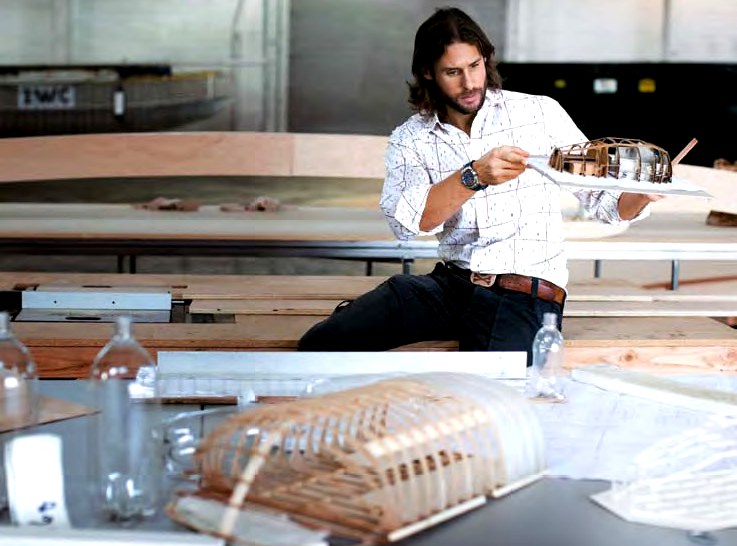
INNOVATION - Adventure Ecology commissioned company exploration architecture to design the vessel. it is engineered almost entirely from the 12,500 reclaimed plastic bottles that provide 68% of the boat’s buoyancy. a recyclable plastic material made from srPET makes up the super structure and the mast is made with a reclaimed aluminum irrigation pipe. the one-of-a-kind sail is hand-made from recycled PET cloth and the secondary bonding is reinforced using a newly developed organic glue made from cashew nuts and sugar cane.
MEDIA
In 2007 de Rothschild wrote The Live Earth Global Warming Survival Handbook: 77 Essential Skills to Stop
Climate Change
- Or Live Through It (ISBN 978-1-59486-781-1), with afterword by Kevin Wall, which was the official companion book to the Live Earth concert series.
In 2008 he was the Consultant Editor for Earth Matters: An Encyclopedia of Ecology, wrote an action graphic novel, The Boy,The Girl,The Tree with artist Simon Harrison and wrote the Foreword to True Green Kids: 100 Things You Can Do to Save the Planet.
In 2008, alongside others including Zac Goldsmith, David Cameron's environmental advisor, de Rothschild helped to write the commentary for the book Antarctica - The Global Warning.
De Rothschild is a Huffington Post contributor, commenting on environmental issues. In early 2010 he also trademarked the phrase Equation For Curiosity.
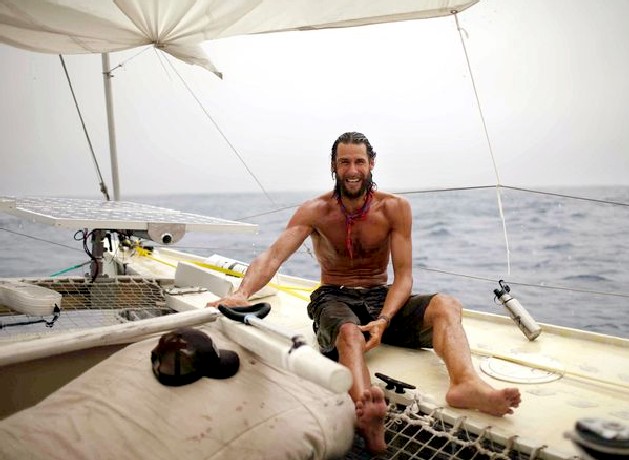
FILM WORK
In 2012 de Rothschild developed Eco Trip: The Real Cost of Living, an eight part series on the production methods behind household items and the impact their use has on the environment. Each episode covers the full life cycle of the products.
AWARDS
David de Rothschild was awarded the accolade of "Emerging Explorer" by National Geographic, was appointed an "international ambassador" by NGO Clean Up the World and nominated as a "Young Global Leader" by the World Economic Forum.
In 2007 de Rothschild was named one of GQ Magazine's men of the year, being the sole individual named to the "Environmentalist" category. The following year, due to his efforts at involving youth in environmental issues, he was the 2008 winner of the Kids' Choice Awards UK "Greenie Award".
In 2009 Rothschild was named by the United Nations Environment Program as a "Climate Hero".
In 2011 de Rothschild served on the judging panel for the International Green Awards as well as the Climate Week Awards. In 2011 he also received the Honorary Award of the German Sustainability Award.
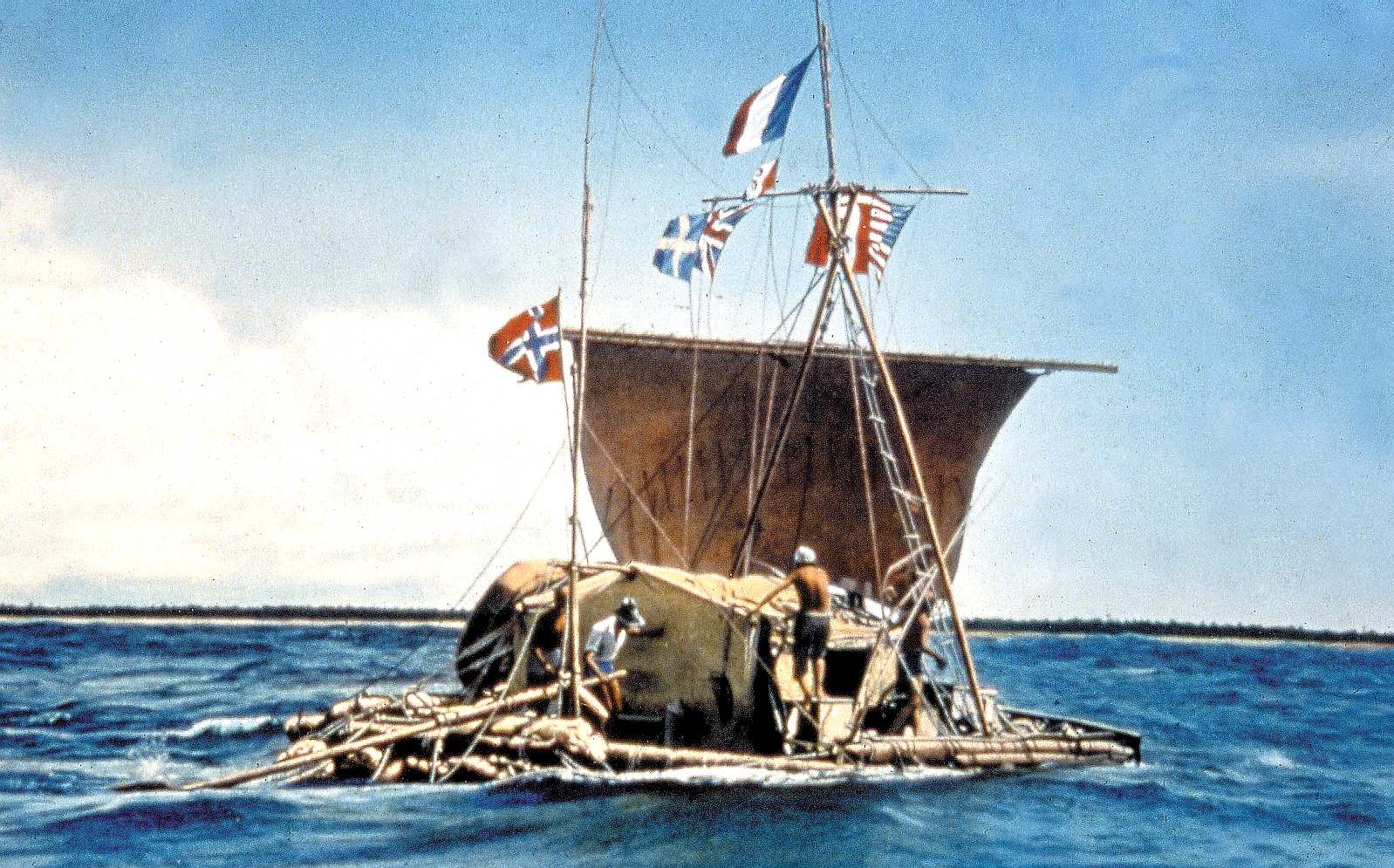
KON
TIKI
- The raft expedition
of Thor Heyerdahl in 1947 inspired many to use rafts and sails to highlight
political or social issues. Thor was also famous for his Ra
project in 1970.
CONTACTS
....
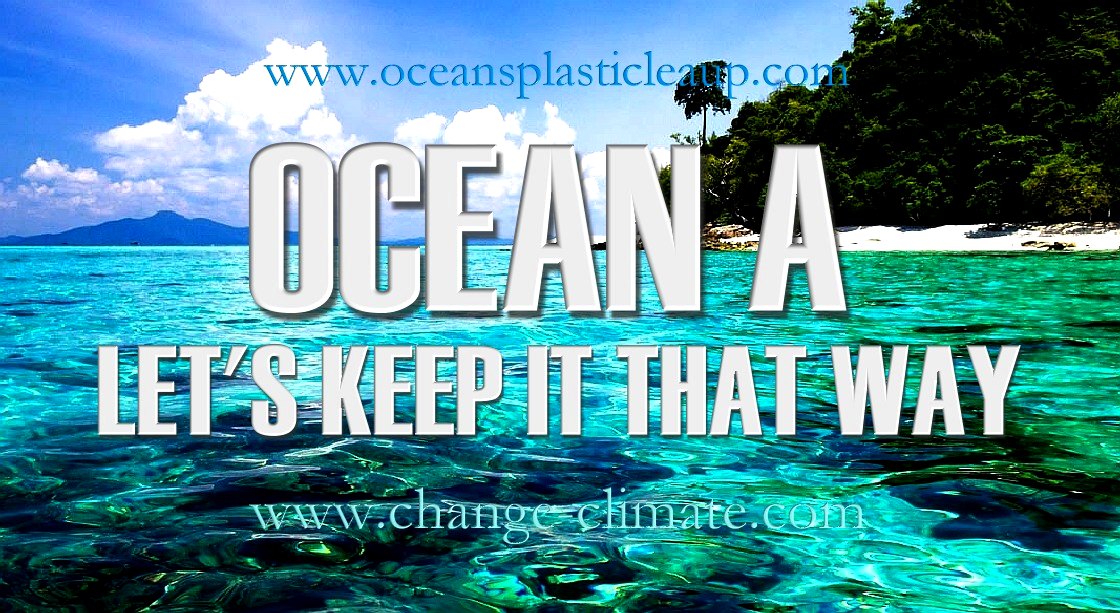
OCEAN
CLEANUP PROJECTS
*
Adidas
*
Algalita
research foundation *
Aliance
to end Plastic Waste AEPW
*
Boyan
Slat's ocean booms
*
Fionn
Ferreira's ferrofluid extraction of microplastics
*
Greenpeace
*
5Gyres Institute
*
Junk
Raft - Plastic awareness expedition
*
Kulo
Luna graphic novel
*
4Ocean recycled plastic bracelets
*
Ocean
Voyages Institute
*
Ocean Waste Plastic
*
Plastic Free
Eastbourne
*
Plastic Oceans Canada *
Plastic Oceans Org
*
Plastic Oceans UK
*
Plastiki
David De Rothschild's catamaran
*
Recycling Technologies *
Rozalia Project
*
Seabin
*
Sea Litter
Critters
*
SeaVax autonomous drones
*
Surrey University PIRATE
& Triton
*
World Oceans Day
As
you can see from the list above, David De Rothschild is not alone in his fight against plastic waste in our oceans
....
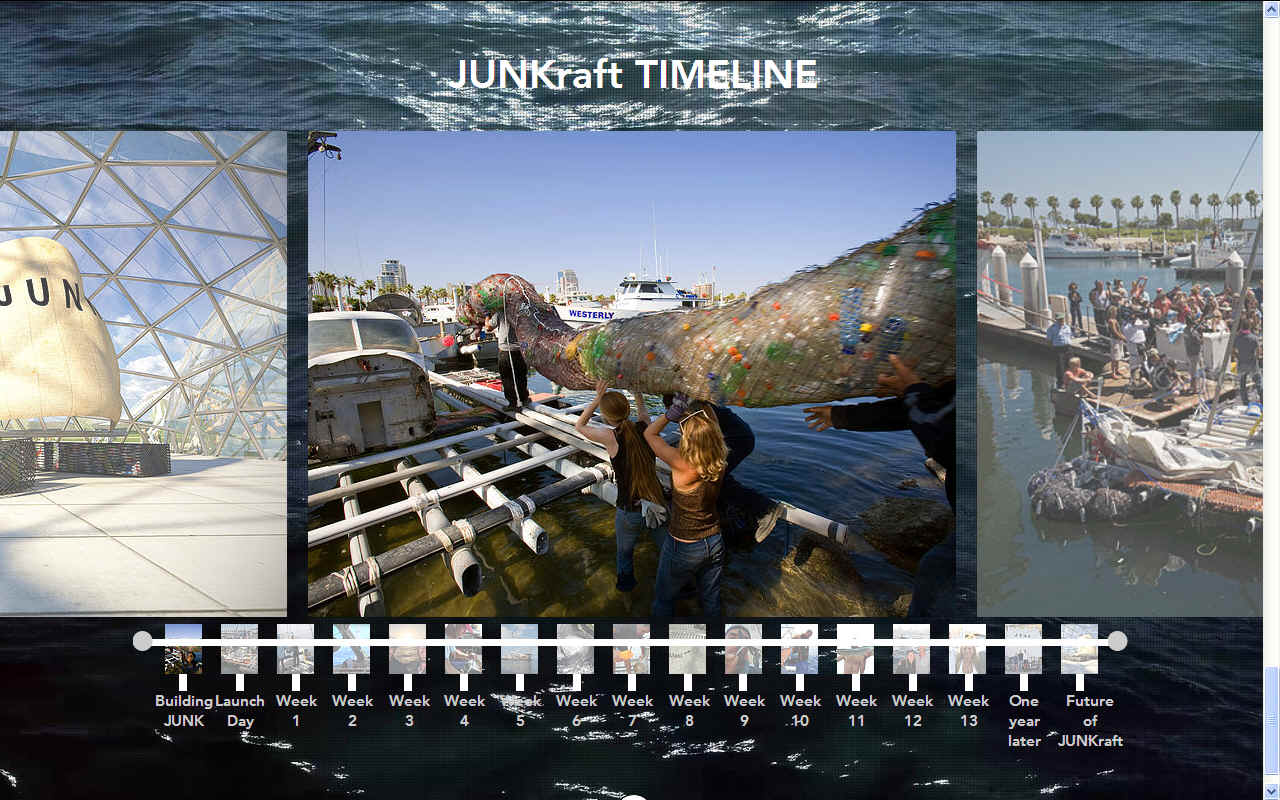
JUNK
RAFT - Another
project to highlight the absurd volume of plastic in our oceans, is that of
5Gyres co-founder Marcus Eriksen, with a much cheaper way of staying afloat
use nets to contain enough PET bottles to remain buoyant for long enough to
cross part of an ocean.
LINKS
& REFERENCE https://www.australiangeographic.com.au/topics/science-environment/2010/07/green-message-in-12,500-bottles/ https://www.designboom.com/design/plastiki-arrives-in-sydney/ http://www.travelettes.net/travel-links-of-the-week-4/ https://tanedesign.wordpress.com/2012/09/27/sailing-the-pacific-in-a-boat-made-of-plastic-bottles/ http://ecoprotection.blogspot.com/2009/05/david-de-rothschilds-plastiki.html https://www.theguardian.com/environment/2009/apr/12/david-de-rothschild-plastiki-pacific https://www.theguardian.com/environment/2009/oct/11/sailing-plastiki-david-de-rothschild https://www.plasticpollutioncoalition.org/blog/2017/8/14/the-true-story-of-junk-raft-and-the-rise-of-activism-to-fight-plastic-pollution https://www.hawaii.edu/news/2018/08/21/eriksen-junk-raft-lecture/ https://www.marcuseriksen.com/home https://en.wikipedia.org/wiki/Plastiki http://theplastiki.com/ https://www.5gyres.org/ |









